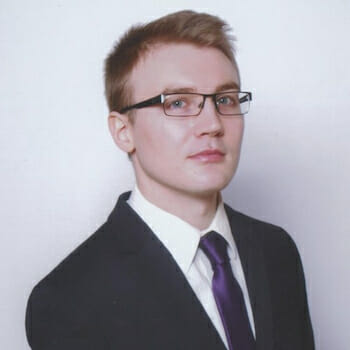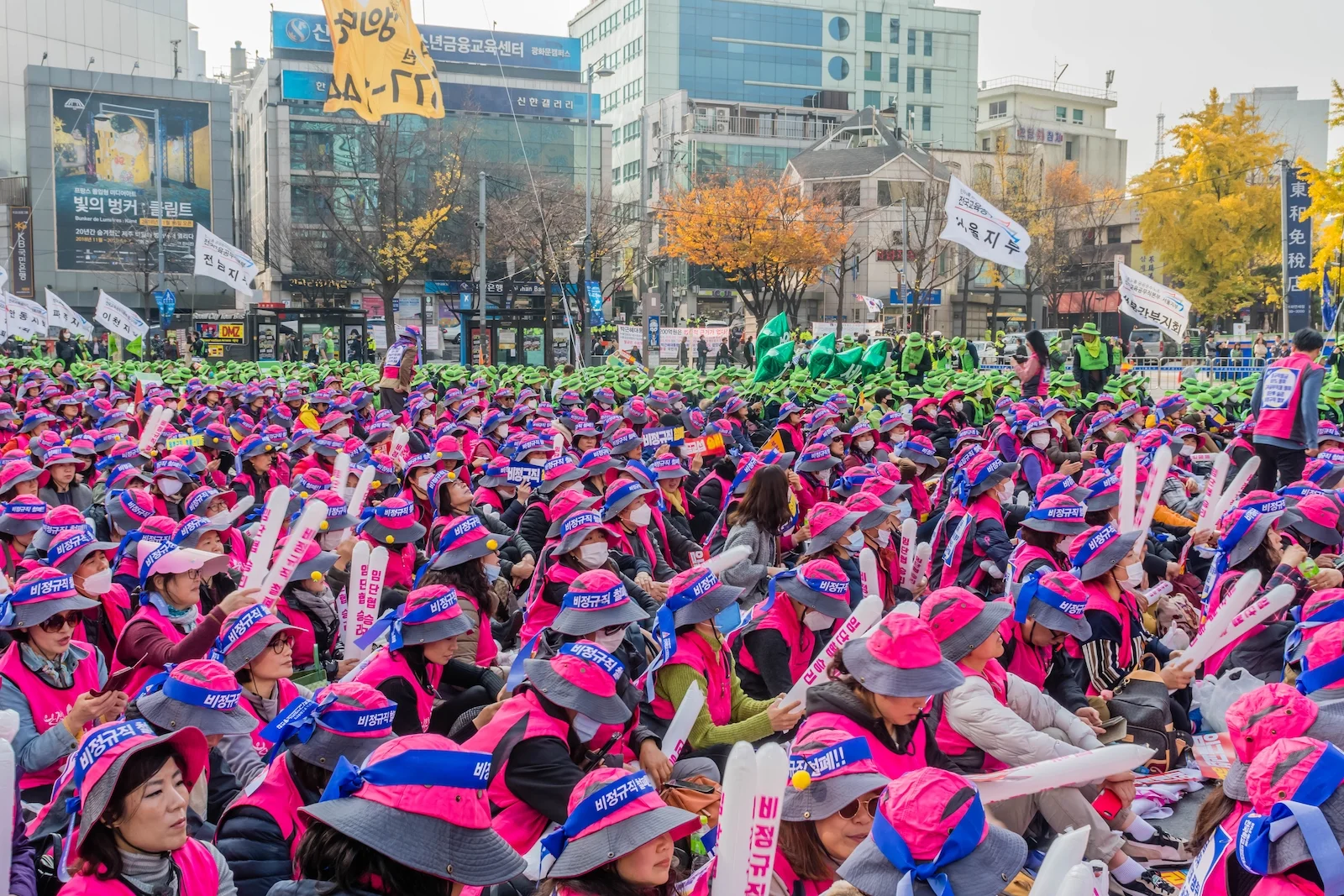
How South Korean Feminists Are Resisting the Conservative Tide
Founded in 1987, the Korean Women’s Associations United (KWAU) emerged as a coalition of women’s rights groups committed to advancing gender equality, democracy, and social justice in South Korea. Over the decades, KWAU has been at the forefront of major legal and policy victories, from the abolition of the patriarchal Hoju family registry system in 2008 to the implementation of gender quotas in politics and stronger protections against sexual and domestic violence. However, as South Korea’s political landscape shifts, so do the challenges facing the feminist movement.
With conservative governments pushing back against gender policies, KWAU has recalibrated its strategy—emphasizing public awareness campaigns, international solidarity, and grassroots organizing to sustain the momentum for women’s rights. Kyungjin Oh, former Executive Director and now Vice Chair of KWAU’s International Solidarity Center, speaks to the movement’s latest battles: a growing anti-feminist backlash among young men, the country’s record-low birth rate, and the broader rollback of gender equality under conservative leadership. Despite mounting opposition, KWAU remains steadfast—mobilizing intergenerational feminist activism, leveraging UN advocacy mechanisms, and rallying national support to assert that gender equality isn’t just a political stance but common sense.
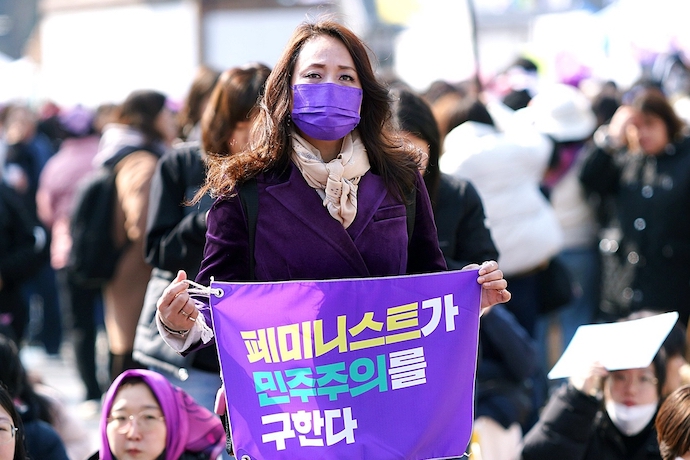
Scott Douglas Jacobsen: Can you start by giving some of your background?
Kyungjin Oh: I began my activism career in 2014. After two years of experience working with the Korean Women’s Political Solidarity, a member organization of KWAU, I moved to KWAU in February 2016. So, I have been working with KWAU for more than nine years. Since my recent transition, I would like to briefly introduce my new role before moving on to the main questions.
We are increasingly focusing on international solidarity and activism, particularly in the Asia-Pacific. Although feminist issues are diverse globally, we are working to amplify women’s voices from Asia-Pacific countries.
KWAU has a strong tradition of women’s organizing. Many women’s rights organizations in the Asia-Pacific region look to KWAU’s experiences to learn how to build strong organizations and effectively mobilize women’s voices nationwide, as we have done for more than 37 years.
We are trying to share our organizing experiences and build solidarity and a network among the Asia-Pacific countries. I will strengthen the women’s network in the region. One organization is APWLD—the Asia Pacific Forum on Women, Law and Development.
APWLD is also an umbrella networking organization comprising more than 200 women’s rights organizations in the Asia-Pacific region. KWAU plays a major role in organizing women’s networks in the Asia-Pacific region.
Additionally, we are engaged in many advocacy activities directed at the United Nations. For example, at the domestic level, it has become increasingly challenging to raise women’s voices under the current South Korean government, which is opposed to feminist values and women’s organizations’ activities.
So, we are utilizing UN mechanisms to strengthen our advocacy at the domestic level by gaining international recognition and support.
Jacobsen: What are the key advocacy areas of the Korean Women’s Associations United today?
Oh: KWAU was founded in 1987, so it has been more than 37 years now.
Traditionally, we have focused on legal and policy advancements related to women’s rights and gender equality. For more than 30 years, we have concentrated on leading legal and policy changes, engaging in advocacy efforts directed at the government and the National Assembly. We work to strengthen networks and partnerships with government stakeholders and politicians who support women’s rights.
Yes, we have made significant progress. For example, we contributed to the adoption of the Sexual Violence Law in the 1990s. Additionally, we played a role in implementing gender quotas in politics, which require political parties to nominate at least 50% of women candidates in the proportional representation system.
However, despite these legal and policy advancements, we face a new challenge. Internationally, South Korea is often regarded as a country with high-quality laws and policies on gender equality and women’s rights. However, these laws are poorly implemented due to low gender awareness in society.
Therefore, we focus more on raising public awareness about feminist values and gender equality. We aim to reach more people, particularly young women, university students, and teenagers, so they can understand that feminist values are a fundamental part of common sense.
Jacobsen: How have KWAU’s strategic priorities evolved? Targeted objectives for the organization in the 1980s, 1990s, 2000s, and 2010s. They would have been different in each decade. How have they changed over time?
Oh: The history of Korean democracy is relatively short. Only in 1987 did Korea achieve formal democracy. During the military regime before 1987, Korean citizens had no right to elect their president directly.
KWAU was founded in 1987, at the same time that Korea transitioned to democracy. Many of our senior members who founded KWAU were activists who fought for Korean democracy. However, they soon realized that without an independent organization dedicated specifically to women’s rights, women’s rights would never be fully achieved.
Even within the democracy movement, women were not recognized as genuine activists. Korea was, and still is, a patriarchal society, and even within the pro-democracy movement, women faced gender-based discrimination.
Our senior members saw an urgent need to establish a women’s rights organization fully dedicated to fighting for gender equality. That is why KWAU was founded.
In the late 1980s and early 1990s, KWAU focused on passing laws and policies that would protect and advance women’s rights. At that time, South Korea had very few legal protections for women. Although there were some policies for women, they were based on conservative family values, which primarily saw women as mothers and homemakers.
During this period, we worked to introduce and improve legal protections for women. That is why, from the 1990s to the early 2000s, we achieved many legal and policy advancements for women’s rights.
From the 1990s to the early 2000s, the women’s movement achieved many legal and policy advancements.
However, from the mid-2000s to 2010, we faced increasing challenges. We had so much success in the 1990s and early 2000s because we could gain support from the National Assembly, especially politicians favoring women’s rights. At that time, the government was led by progressive or semi-progressive parties, which allowed us to collaborate with policymakers and government institutions.
However, in February 2008, the Lee Myung-bak government took power. His administration was highly conservative and strongly opposed the progressive women’s rights movement.
After his term, Park Geun-hye became South Korea’s first female president. Still, she was also from a conservative party—the party currently in power, the People Power Party (PPP). From 2008 to early 2017, the women’s rights movement struggled to progress significantly. Even though we remained active in advocacy efforts, we received very little support from the government, as it sought to suppress progressive women’s activism.
So, from the late 2000s to early 2017, we could not achieve the same legal and policy advancements as in the 1990s and early 2000s. During this period, we shifted our focus to strengthening the grassroots movement.
In February 2017, Park Geun-hye was impeached, and her administration ended.
After that, the Moon Jae-in government took power. His government favoured women’s rights activism more than the previous conservative administrations. However, there were still gaps between the demands of the women’s movement and the government’s policies.
During the Moon Jae-in administration, we saw the rise of a new wave of feminist activism, particularly among young women. Many of these activists were not affiliated with traditional women’s rights organizations, but they self-organized, using online platforms to advocate for gender equality.
In May 2022, after Moon Jae-in’s presidency, Yoon Suk Yeol came to power. As you mentioned, one of his central campaign promises was anti-feminism.
He mobilized young male voters who were against feminist values, the MeToo movement, and young women’s organizing efforts. He openly opposed gender equality policies and promised to dismantle institutions that supported women’s rights. Unfortunately, he became president.
Under Yoon Suk Yeol’s administration, for the past three years, the women’s rights movement has faced severe repression.
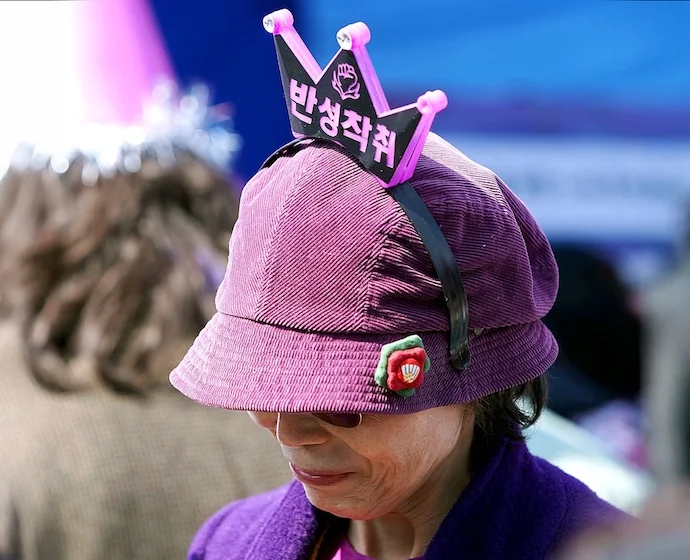
Jacobsen: Now, for those who may not be aware—just as a note on cosmic irony—what happened to that government in December? Where is that anti-feminist leader now?
Oh: After he took office in May 2022, progressive women’s rights organizations led the opposition to him.
Over the past three years, Yoon Suk Yeol’s policies have been extremely regressive, not only on women’s rights but also on social progress in general. Many progressive civil society organizations have opposed his political agenda.
In October and November of last year, civil society organizations—including us—began internal discussions about whether we should actively campaign for his impeachment.
However, in December, everything escalated suddenly. Yoon Suk Yeol declared martial law, which outraged many people. So, just two or three weeks ago, we gathered in large numbers.
Even 30 or 40 years ago, during the era of dictatorship in Korea, people suffered immensely. Many of our parents, their friends, siblings, and family members were disappeared, kidnapped, tortured, and even killed by the authoritarian government.
So, when martial law was declared, its symbolic meaning was clear to the Korean people. It immediately reminded them of those painful times—before Korea achieved democracy. Martial law was declared on December 3. However, within one to two hours, the National Assembly passed a resolution to lift it. The martial law was lifted just six hours after it was declared.
Although the immediate crisis was resolved, the people and progressive politicians came to a clear realization: Yoon Suk Yeol is too dangerous to remain in office. He cannot be allowed to serve even one more day as president.
Civil society organizations urgently formed a coalition in response to force him out of office. We began organizing regular demonstrations before the National Assembly, calling for President Yoon Suk Yeol’s impeachment. On December 14, the National Assembly passed the impeachment motion.
Now, we are holding regular mass demonstrations in Gwanghwamun Square and Seoul Square, demanding that the Korean Constitutional Court uphold the impeachment. The court’s final decision on whether to remove Yoon Suk Yeol from office is expected in late March.
However, even though Yoon Suk-you is in prison, he is actively working to organize ultra-conservative groups. Korean society is now profoundly politically divided.
Jacobsen: What do you want to say about your thoughts on the potential presidential election?
Oh: Yes. Well, there are a few things to consider. First, regarding the anti-feminist leader who attempted to declare martial law, to clarify, martial law is an extremely serious crime under the Korean Criminal Act, with a maximum sentence of life imprisonment. So, one way or another, Yoon Suk Yeol will receive a prison sentence. However, the dangerous thing is that, as I mentioned before, even while in prison, he is actively working to organize ultra-conservative groups.
The People Power Party (PPP), which Yoon Suk Yeol belongs to, is doing everything possible to prevent the progressive party from winning the next presidential election. Meanwhile, progressive civil society organizations like ours organize large demonstrations, press conferences, and public advocacy campaigns. However, in central Seoul, many people still support the messages of the ultra-conservative groups.
This has led to street conflicts, as both sides hold mass demonstrations simultaneously, with extreme and polarizing messages. South Korea is now witnessing a deep political divide, much more than before.
You probably already know this, but we have a very strong ultra-conservative Christian network in Korea. This group holds significant political power, and its influence is growing. The People Power Party (PPP) is now strengthening its ties with these ultra-conservative Christian groups because they believe this Christian network can mobilize the conservative public.
This is not our first experience organizing an impeachment campaign. We went through a similar movement seven years ago, between February 2016 and February 2017, when we successfully pushed for President Park Geun-hye’s impeachment. However, back then, Korean society was not as politically divided as today.
At that time, even some conservative politicians within Park Geun-hye’s party acknowledged that she had committed serious wrongdoing. They supported her impeachment to protect their political future, believing that allowing her to remain in office would be more damaging in the long run. This created space for social and judicial accountability to take place.
However, the situation today is entirely different. The People Power Party (PPP) is now taking an extreme position—it is doing everything it can to prevent the progressive political party from gaining power in the next presidential election.
One of their most targeted demographics is young men. They are actively mobilizing discontent among young men, particularly those who feel alienated by feminist policies or economic instability.
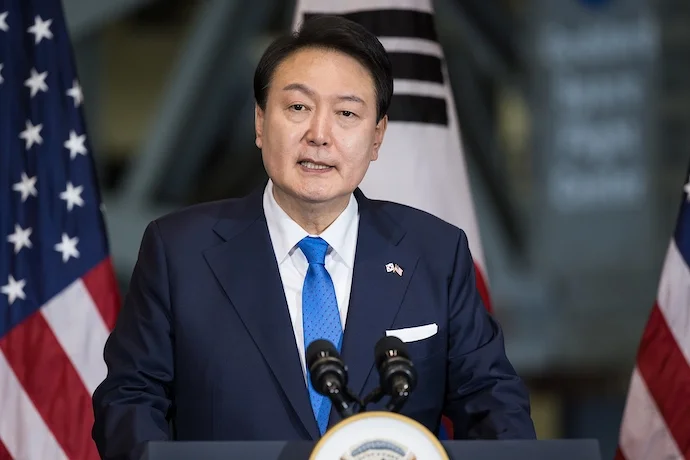
Jacobsen: That’s happening here too. We see the same pattern.
Oh: The PPP and its allies are weaponizing grievances to build a reactionary political base, much like we’ve seen in other countries.
Many people support President Yoon Suk Yeol because of his anti-feminist campaigns. His base consists largely of young men who feel alienated by feminist policies and older, conservative voters who tend to oppose progressive social change.
Jacobsen: South Korea has a significant Christian population alongside a large non-religious majority. Which Christian denominations have been most opposed to feminist activism, and which religious groups have supported gender equality efforts through advocacy and activism?
Oh: Our strategy for the women’s rights movement is based on collaboration and building strong networks. KWAU is an umbrella organization representing 36 women’s rights organizations across South Korea. Among our member organizations is the Women’s Theological Coalition, a group of progressive Christian women who actively support LGBTQ+ rights and advocate for human rights protections for sexual minorities.
They are also deeply involved in campaigns for the Comprehensive Anti-Discrimination Law, which aims to protect marginalized communities from discrimination. In addition to this, we have other progressive Christian allies who support human rights, feminist movements, and broader social justice issues. However, these progressive Christian groups are quite small and constantly targeted by ultra-conservative religious groups.
In South Korea, 70–80% of Christians tend to be politically conservative. Their conservatism is not only political but also cultural, particularly when it comes to women’s rights and gender equality. Many of them oppose abortion, believe that women should be married to men, and insist that the traditional family structure must be preserved. According to their worldview, women’s primary roles should be to care for the family, do housework, give birth to children, and nurture them. This traditionalist mindset still dominates much of South Korean Christianity.
Jacobsen: South Korea ranks low on gender equity, with surveys showing a stark gap in how men and women perceive inequality. Given this, what is KWAU’s most significant sociopolitical achievement?
Oh: As mentioned earlier, KWAU’s primary strategy is legal and policy advocacy—pushing for legislative advancements through government lobbying and engagement with the National Assembly. Over the years, we have achieved many legal and policy advancements, and these changes have significantly shaped Korean society.
One of the most transformative victories in the fight for women’s rights was abolishing the patrilineal family headship system—the Hoju system. For many years, the Hoju system legalized households by making only male family members the legal heads. In official civil documents, all other family members were listed under the Hoju (family head). Under this system, a woman’s legal status was defined by a male family member, usually her father or eldest son.
For example, when a husband died, his firstborn son would automatically inherit the family headship, even if the mother was still alive. This system legally reinforced gender discrimination, denying women equal legal status within the family.
The Hoju system affected women in many ways, particularly in inheritance laws, family registration, and divorce proceedings. For example, if a husband and wife divorce and the wife later remarries, she cannot change her child’s family name without the explicit permission of her former husband. In Korean society, family names carry deep social significance.
If a child had a different family name from their father, they would often be bullied in school. There is a strong cultural expectation that children should inherit their father’s surname, and divorced families are often socially marginalized in our conservative society.
Because of this, KWAU viewed the Hoju system as a clear example of gender-based discrimination. We organized extensive campaigns and demonstrations, contacting the National Assembly and pro-women’s rights politicians.
Additionally, we collaborated with government partners, including the Ministry of Gender Equality and Justice, to push for legal reform. Finally, in February 2005, the National Assembly passed a bill abolishing the Hoju system.
Of course, there were some limitations. At the time, we were unable to eliminate all remnants of the Hoju system due to strong opposition from senior conservative male groups. However, the abolition of the patrilineal family headship system remains one of the clearest examples of societal change in South Korea.
Jacobsen: The Hoju system was ruled unconstitutional in 2005 and officially abolished in 2008, marking a major step toward gender equality. This mirrors broader struggles to replace patriarchal structures with more equitable systems. How does KWAU collaborate with other feminist organizations to advance women’s rights?
Oh: Yes. Traditionally, KWAU has been an umbrella organization uniting various women’s rights organizations across South Korea. Our main strategy has always been collaboration—building networks and strengthening alliances with other feminist and civil society organizations supporting progressive women’s rights values.
For example, in February 2017, young women began coming forward to speak about their experiences with sexual violence. They led efforts to raise awareness of sexual harassment and abuse—not only in their daily lives but also in digital spaces where online sexual violence was becoming a growing issue.
KWAU recognized that we needed to expand our power base to effectively advance women’s rights. This meant reaching out to unorganized women, particularly those in their twenties and thirties, and encouraging them to participate in campaigns and demonstrations.
When the #MeToo movement gained momentum in February 2017 and 2018, KWAU played a critical role. While young women were leading grassroots activism, KWAU leveraged its established networks to connect their voices to policymakers. As an organization with decades of experience in legal and policy advocacy, we positioned ourselves as a bridge—directly bringing women’s grassroots demands to government officials and the National Assembly.
We organized seminars, press conferences, and policy discussions, creating spaces where politicians and government representatives could hear women’s voices. Our goal was to translate grassroots activism into tangible policy change.
Through these efforts, we were able to convey the real-life experiences of women on the ground and pressure the government to respond with concrete legal reforms. We pushed for stronger protections against sexual violence, as well as systemic changes to address broader gender inequalities.
Of course, there are various dynamics within the feminist movement itself. Different generations, issues, and perspectives naturally lead to divergent opinions and approaches. However, these discussions and debates are ultimately productive because they help refine our strategies and ensure we remain inclusive and representative.
KWAU actively organizes women, particularly young women in South Korea, and ensures their perspectives and demands are heard. We continue to listen, adapt, and push forward, ensuring that feminist activism leads to real policy change and greater gender equality.
Jacobsen: I don’t know if there’s a phrase for this in Korean, but in English, there’s an expression called “narcissism of small differences.” It’s pretty self-explanatory, but it’s a well-known phenomenon, particularly in feminist movements in North America. For example, in umbrella organizations, one feminist group may strongly disagree with another over which issues should be prioritized, which can escalate into an organizational conflict. Often, these disputes are less about ideology and more about clashes between the leaders of those groups. Is this a phenomenon in feminist organizations in South Korea as well? Is this an international trend?
Oh: Yes, this happens here, too. As you mentioned, it also relates to priority areas in the feminist movement. The movement has many different perspectives and priorities stemming from generational and ideological differences. KWAU was founded in 1987, and many founding members had direct experience in the Korean democracy movement.
For them, ideology was central. They believed we must change the system for women to be truly free. This meant studying how capitalism functions, how political and economic structures shape women’s experiences, and how these systems exert both direct and indirect influence over women’s daily lives.
As an older feminist organization, KWAU has always taken a broad, systemic approach to women’s rights. We examine how political, economic, and social structures intersect with gender issues and advocate for structural reforms rather than focusing solely on individual cases of discrimination or violence.
However, some of the younger generation of feminists in South Korea take a different approach. Many young women today are extremely vocal and active in pushing for social change. They have a strong gender consciousness and recognize how harmful Korea’s patriarchal traditions are for women.
However, their activism is often rooted in personal experiences rather than systemic analysis. As a result, their primary areas of focus are gender-based violence and digital sexual violence—issues they experience in their daily lives.
In recent years, because of the growing visibility of young women’s activism, journalists, politicians, and the broader public have started to pay more attention to sexual violence and online harassment. As a result, these issues are now widely framed as the most urgent feminist concerns in South Korea.
Of course, KWAU fully supports efforts to combat sexual violence, as we also see it as an important issue. However, addressing one problem at a time without structural and systemic changes will not be enough.
That is why KWAU focuses on how political, economic, and social systems shape women’s lives. While we support campaigns against sexual violence, we also emphasize the need for broader structural reforms that will create lasting gender equality in South Korea.
Jacobsen: Education has long been an arena where men and women who support gender parity have fought for change. But what contemporary challenges do you see in advancing gender equality in South Korea today?
Oh: I’d like to highlight two key issues. First, as I mentioned earlier, there is a growing divide in gender awareness—not just regarding feminist values but progressive social values in general.
Young women are becoming increasingly progressive and engaged, while young men are moving in the opposite direction, becoming more conservative. Young women today are more willing to speak out about their experiences with gender discrimination and social injustice. They actively participate in movements, including demonstrations calling for President Yoon Suk Yeol’s impeachment.
Right now, more than 80% of the demonstrators calling for his impeachment are young women, especially those in their teens and twenties. They are learning that feminist values are foundational for achieving societal structural change.
However, young men are becoming increasingly conservative. Many of them see feminism as a threat rather than as a movement for equality.
In a patriarchal society like South Korea, young men still benefit from gender inequality in many ways. But now, they feel that feminist activism is reducing their status. Many of them believe that women’s rights movements are harming society and target feminist organizations as enemies.
This growing gender divide is one of the biggest contemporary challenges in advancing gender equality in South Korea today. Everyone, including young men, is becoming more vulnerable in this harsh capitalist society. Economic instability and increasing social pressures have left many insecure about their future.
However, many young men blame the feminist movement for their declining status rather than recognizing the broader structural problems in economics, employment, and politics. They see the strength of the women’s rights movement as the reason for their struggles rather than acknowledging the systemic issues affecting all people.
This trend became especially clear three years ago when Yoon Suk Yeol ran for president. Many young men actively supported his anti-feminist ideology, believing his campaign promises to push back against feminism and reassert traditional gender roles.
Now, we are seeing the same pattern in pro-Yoon Suk Yeol demonstrations. Many participants are young men standing at the forefront of ultra-conservative activism.
Earlier this year, we saw how extreme these movements could become in January. A group of ultra-conservative demonstrators attacked the court, breaking windows and physically harming government officials.
Jacobsen: That sounds like Trump supporters storming the U.S. Capitol.
Oh: Yes, it’s a very similar situation.
More than 100 people were arrested following the attack, and they are now facing prosecution. However, most concerning is that most of them were young men. Right now, young men are in charge of supporting Yoon Suk Yeol and ultra-conservative values. This presents one of the biggest challenges for women’s rights activism today.
How do we persuade young men that women’s rights and feminist values are common sense? How do we show them that gender equality is a fundamental part of progressive social values rather than something harmful?
This is the first major challenge we are facing. The second challenge is South Korea’s record-low birth rate, which is the lowest in the world.
The current government’s response to this issue has been deeply regressive. Instead of addressing why people don’t want to have children, they are framing women as tools for childbirth—as if their primary role is to give birth and care for families under a population control plan rather than ensuring that women have reproductive rights and autonomy.
Of course, we recognize that the birth rate crisis is real. It reflects serious societal issues; South Korea will become unsustainable if we do not address them. However, the root problem is not that women don’t want to have children—it’s that they do not feel secure enough to do so. If women believe that this society does not provide a safe and supportive environment for raising children, then they will not choose to have children.
The current government’s political vision does not address these structural problems. Instead, they are taking an extremely regressive approach, treating women as birth-givers rather than autonomous individuals with the right to make their own reproductive choices. This is the second major contemporary challenge that feminist activists in South Korea must confront.
Jacobsen: How does KWAU address workplace, economic, and home-based discrimination in South Korea?
Oh: KWAU is an umbrella organization that brings together 36 women’s rights organizations. Each member organization specializes in a specific agenda related to women’s rights.
For example, some of our member organizations focus specifically on workplace issues, such as sexual harassment and labour rights for women. Others work on gender-based violence, including consultation services for women who have experienced sexual violence, digital harassment, intimate partner violence, or domestic abuse.
KWAU does not directly provide consultation services or handle individual cases of gender discrimination or violence. Instead, we act as a coordinating body, ensuring that the concerns and demands of our member organizations reach the National Assembly, politicians, and government officials.
Because of our experience and network in legal and policy advocacy, we serve as a bridge between grassroots feminist organizations and policymakers, ensuring that women’s rights issues are addressed at a systemic level.
Jacobsen: What are KWAU’s goals for the coming years?
Oh: We have many goals because society is not changing rapidly enough.
Our first major goal is to create a society where gender equality and parity are recognized as common-sense values. As I mentioned, we want to ensure that education plays a key role in shaping gender equality.
We envision a society where children and teenagers learn—both in schools, at home, and in society at large—that women and girls deserve equal respect as human beings. They should not be seen as sexual objects or targets for sexual exploitation and violence. The reason I emphasize this is because of the deepfake sexual violence crisis we faced last year.
Jacobsen: Yes, that issue has been happening over here as well.
Oh: More than 80–90% of the victims were teenage girls, and the majority of perpetrators were teenage boys.
This means that boys are learning harmful behaviours from a young age, using AI and deepfake technology to manipulate images of their classmates for sexual exploitation. This is deeply disturbing because it shows that misogyny and the backlash against feminism are normalized at a young age.
So, one of our top priorities is to reform school curricula and ensure that teenagers—both boys and girls—understand feminist values as an essential foundation for a sustainable society. Our second major goal is to strengthen women’s rights organizations.
Over the past three years, many women’s rights organizations in South Korea have become financially and organizationally vulnerable due to the political climate and lack of government support.
The government’s stance must change because women’s rights organizations have played a critical role in advancing legal and policy reforms. Without their efforts, we would not have achieved so many legislative changes for gender equality.
We want to build a society where the public recognizes these organizations’ importance and is willing to donate even a small percentage of their income to sustain civil society organizations that work for progressive social values, including women’s rights.
Jacobsen: It was lovely to meet you. Thank you so much for your time today—especially for this extended conversation.
Oh: Thank you very much.
